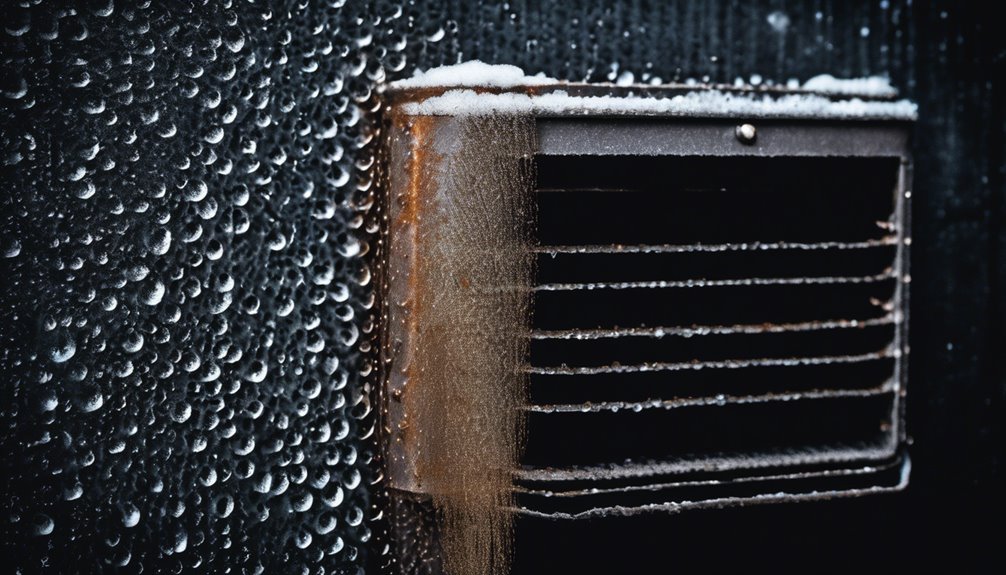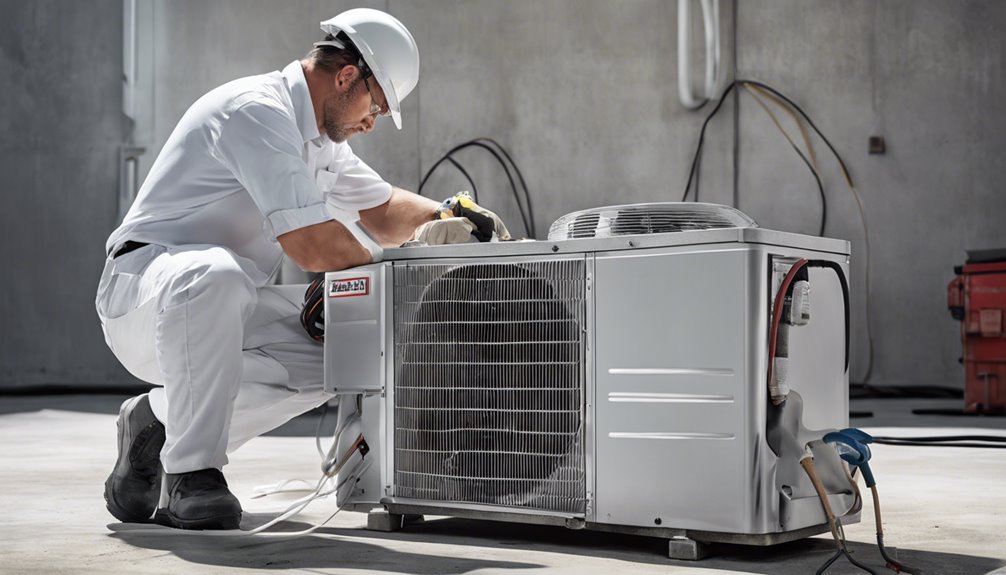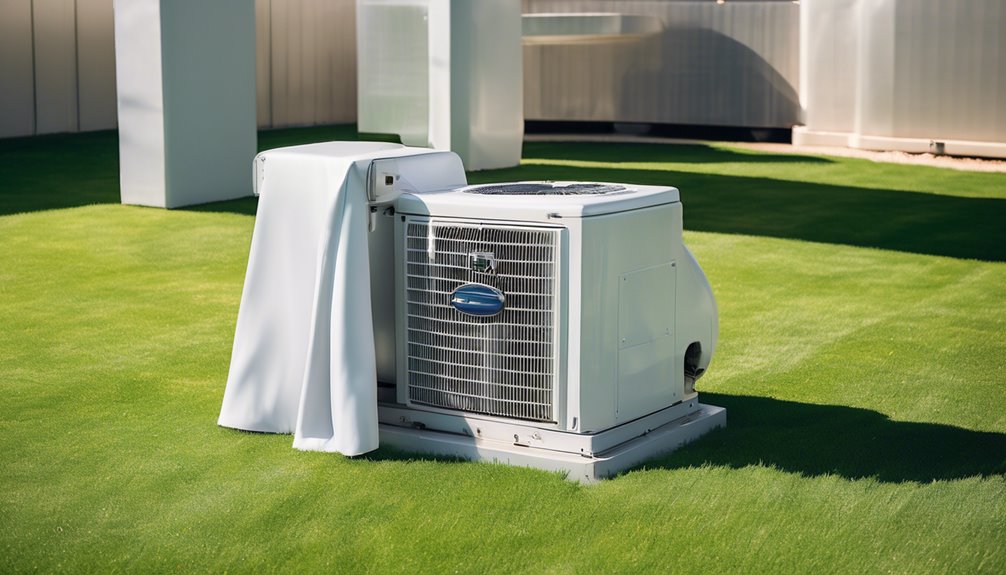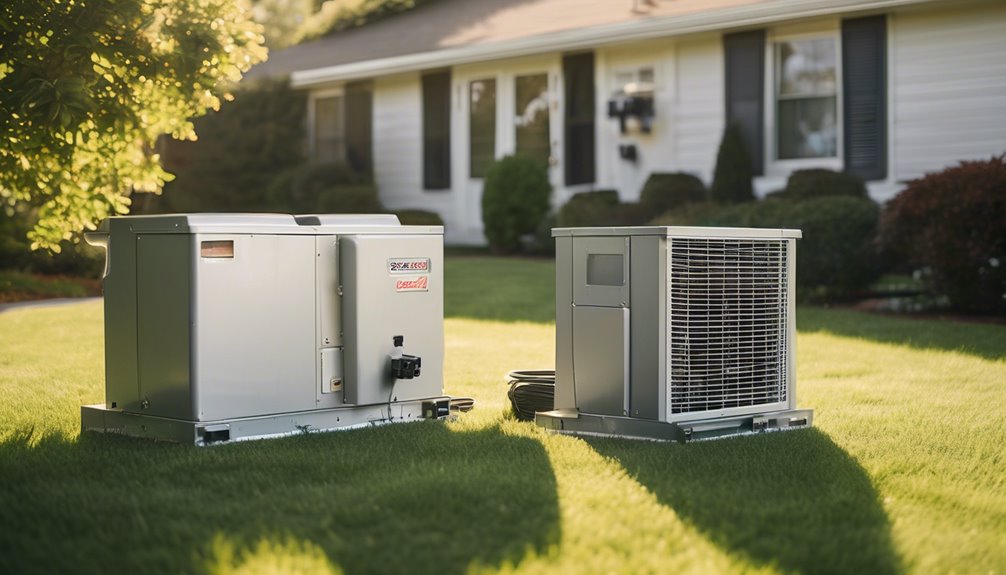If your air conditioner is making strange noises, blowing warm air, or causing your energy bills to skyrocket, it may be trying to tell you something: refrigerant gas leakage is likely occurring, and ignoring these signs can lead to further damage and safety hazards. You might hear hissing sounds, notice ice buildup on coils and pipes, or spot water leaks and puddles around the unit. Unpleasant odors and smells can also signal a refrigerant leak. Don't ignore these warning signs – it's crucial to investigate further to determine the source of the issue and prevent more severe problems.
Key Takeaways
- Unusual noises like hissing, gurgling, or bubbling sounds near the compressor or valves can indicate refrigerant gas leakage in an AC.
- Ice buildup on condenser coils, frost on copper pipes, or water droplets on coils are visual signs of refrigerant leakage and AC malfunction.
- Increased energy consumption and bills can be a warning sign of refrigerant leakage, as the AC works harder to cool the space.
- Cooling performance issues like warm air blowing from vents, reduced cooling power, and temperature fluctuations can be caused by refrigerant gas leakage.
- Unpleasant odors or smells around the AC unit, such as pungent or chemical scents, can indicate refrigerant gas leakage and require immediate attention.
Hissing Sounds and Unusual Noises
When you're standing near your fridge or air conditioner, you often tune out the usual hum of operation.
However, if you're vigilant, you might catch unusual sounds that signal a potential problem. Pay attention to hissing sounds, gurgling noises, or bubbling sounds, as these can indicate a refrigerant gas escape.
When refrigerant leaks, it can cause pressure drops, leading to these unusual noises. If you notice any of these sounds, it's essential to investigate further.
Refrigerant leaks cause pressure drops, triggering unusual noises, so investigate promptly to avoid further damage.
A hissing sound near the compressor or valves might mean refrigerant is escaping, while gurgling noises could indicate a blockage or restriction in the system.
Don't ignore these signs, as they can lead to more severe issues if left unchecked.
Ice Buildup on Coils and Pipes
As you investigate potential refrigerant leaks, don't overlook the visual signs that can confirm your suspicions. One common indicator is ice buildup on coils and pipes. When refrigerant leaks, the AC's cooling capacity is compromised, causing the coils to freeze. A frozen condenser or iced-over coils are clear signs of refrigerant leakage.
| Visual Signs | What it Indicates |
|---|---|
| Ice buildup on condenser coils | Refrigerant leakage, reduced cooling capacity |
| Frost or ice on copper pipes | Insulation damage, refrigerant leak |
| Water droplets or condensation | Refrigerant leakage, AC malfunction |
| White or frosty residue on coils | Refrigerant leakage, coil blockage |
Performing regular coil inspections can help you identify these issues early on. Don't wait until your AC breaks down – check for ice buildup and refrigerant leaks today!
Increased Energy Bills and Consumption
You're likely to notice increased energy bills and consumption if your refrigerant is leaking, and it's not just a minor hike.
Your monthly charges will be higher, and you might see unexplained cost spikes that don't match your usual usage patterns.
Additionally, your system will draw more power than usual, putting a strain on your wallet and the environment.
Higher Monthly Charges
Higher energy bills and consumption can be a warning sign that your refrigerant is leaking. You might notice your monthly charges are higher than usual, which can be a significant budget impact.
When you conduct a cost analysis, you may find that your energy consumption has increased, even if you haven't changed your usage habits. This could indicate that your AC is working harder to cool your space, resulting in higher energy bills.
Take a closer look at your energy consumption patterns and compare them to previous months or years. If you notice a consistent increase, it's possible that refrigerant leakage is the culprit. Don't ignore this sign, as it can lead to further damage to your AC unit and more costly repairs down the line.
Increased Power Draw
Your air conditioner's increased power draw is a clear indication that something's amiss.
You mightn't notice it at first, but a steady power surge or energy spike can quickly add up.
When your AC's refrigerant levels drop, the system has to work harder to cool your space, resulting in a significant increase in energy consumption.
This means your AC is drawing more power than usual to compensate for the loss of refrigerant.
Keep an eye on your energy bills; if you notice a sudden spike, it could be a sign that your AC is leaking refrigerant.
Unexplained Cost Spikes
One of the most significant indicators of refrigerant gas leakage is an unexplained spike in your energy bills and consumption. You might notice that your energy bills are higher than usual, even though you haven't changed your cooling habits. This could be a sign that your AC is working harder to cool your space, which can lead to increased energy consumption.
| Month | Energy Bill | Usage (kWh) |
|---|---|---|
| Jan | $120 | 800 |
| Feb | $150 | 1000 |
| Mar | $180 | 1200 |
| Apr | $200 | 1400 |
| May | $220 | 1600 |
When you conduct a budget analysis and track your costs, you'll likely notice a pattern of increasing energy bills. This is a red flag that warrants further investigation. Don't ignore these signs, as they could be indicative of a refrigerant gas leak in your AC.
Warm Air Blowing From Vents
When the refrigerant gas in your air conditioning or refrigeration system starts to leak, it can cause a range of problems, including warm air blowing from vents.
Refrigerant leaks can trigger a cascade of issues, including warm air blowing from vents, reduced cooling performance, and system damage.
You might notice that the air coming out of your vents feels lukewarm or even hot, which can be uncomfortable and affect the overall cooling performance of your AC.
This issue arises when the refrigerant leak disrupts the air circulation patterns, allowing vented heat sources to dominate the airflow.
As a result, the cooled air can't reach its intended destination, leaving you feeling warm and sticky.
If you're experiencing warm air blowing from your vents, it's essential to investigate the issue promptly to prevent further damage to your system.
Reduced Airflow and Weak Cooling
When you turn on your AC, you expect a refreshing blast of cool air, but if you're noticing insufficient cooling power, it may be a sign of refrigerant gas leakage.
You might also experience weakened air circulation, which can make your space feel stuffy and uncomfortable.
If you're not getting the cooling relief you need, it's time to investigate the cause.
Insufficient Cooling Power
Your air conditioner's cooling power takes a hit when refrigerant gas leaks out, and you're the one who suffers the consequences.
As a result, you'll notice a significant drop in the cooling capacity of your AC. This means your home won't cool down as quickly, and the temperature will fluctuate more frequently.
Some common signs of insufficient cooling power include:
- Your AC runs continuously without effectively cooling your home
- The air coming out of the vents is warm or lukewarm
- You notice temperature fluctuations, such as one room being colder than another
Weakened Air Circulation
A refrigerant gas leak can also weaken air circulation in your air conditioner, leading to reduced airflow and weak cooling.
You might notice that the air coming out of your vents is weaker than usual, or that it takes longer to cool your space. This can lead to poor air quality and ventilation issues, making your home feel stuffy and uncomfortable.
As a result, you may experience hot spots or uneven cooling throughout your home. If you're not getting the cooling power you need, it may be a sign that refrigerant is leaking out of your system.
Don't ignore these signs – have your AC unit inspected and repaired to restore proper airflow and cooling.
Water Leaks and Puddles Around the Unit
Refrigerant gas leakage often manifests in unexpected ways, and one of the most telling signs is the sudden appearance of water leaks and puddles around the unit.
You might notice water accumulating near the AC's condenser coils or dripping from the unit's bottom. This is a clear indication that refrigerant is leaking, causing condensation issues.
Watch out for these signs:
- Water damage or staining on walls, floors, or ceilings near the AC unit
- Ice buildup on the evaporator coils or other internal components
- Unusual hissing or gurgling sounds coming from the AC unit, which can indicate refrigerant flowing out
Unpleasant Odors and Smells
The air around your AC unit should be clean and fresh, but if you notice unpleasant odors or smells, it may be a sign of refrigerant gas leakage.
Foul aromas or chemical scents coming from your AC can be a strong indication of a refrigerant leak. These smells can be pungent and overwhelming, making it difficult to ignore.
If you catch a whiff of something strange, don't brush it off as normal AC operation. Investigate the source of the smell and check for other signs of refrigerant leakage, such as hissing sounds or ice buildup.
Frequently Asked Questions
Can I Repair a Refrigerant Gas Leak Myself?
You can try fixing a refrigerant gas leak yourself with a DIY toolkit, but it's often tricky; if you're not comfortable or unsure, don't hesitate to seek professional assistance to avoid further damage or safety risks.
How Long Does It Take to Detect a Refrigerant Gas Leak?
You'll likely detect a refrigerant gas leak within a few minutes to an hour, depending on the sensitivity of your leak detection methods and refrigerant monitoring systems, which can pinpoint the source and severity of the issue.
Is a Refrigerant Gas Leak Harmful to My Health?
You're exposed to refrigerant gas, and it's a concern – it can cause respiratory issues, like coughing and shortness of breath, and even neurological effects, such as dizziness and headaches, so it's crucial to take action and get it fixed ASAP!
Can a Refrigerant Gas Leak Cause a Fire?
You're wondering if a refrigerant gas leak can spark a fire? Yes, it can. Refrigerant gases, like hydrocarbons, can ignite when mixed with air, posing fire hazards and combustion risks, especially near open flames or sparks.
Will a Refrigerant Gas Leak Affect My Ac's Lifespan?
You're probably wondering if a refrigerant gas leak will shorten your AC's lifespan. Yes, it will, as it reduces energy efficiency and compromises system performance, leading to premature wear and tear, and ultimately, a shorter lifespan.
Conclusion
You've checked for the common signs of refrigerant gas leakage in your AC, and now it's time to take action. If you've noticed hissing sounds, ice buildup, increased energy bills, or any of the other warning signs, don't ignore them. Refrigerant leaks can cause serious damage to your unit and the environment. Get your AC serviced by a professional as soon as possible to prevent further damage and ensure your system runs efficiently and safely.



